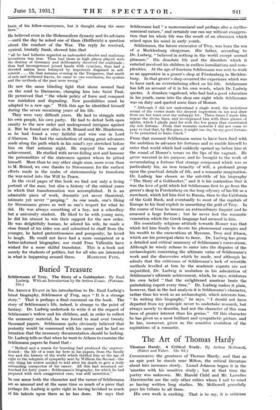Buried Treasure
Sin Awrirun EVANS in his introduction to Dr. Emil Ludwig's latest biography, Schliemann of Troy, says " It is a strange story." That is perhaps a final comment on the book. The story of Schliemann's life, indeed, is strange to the point of fantasy. Dr. Ludwig undertook to write it at the request of Schliemann's widow and his children, and, in order to collect the necessary material, he was forced to read over twenty thousand papers. Schliemann quite obviously believed that posterity would be concerned with his career and he had no intention that the necessary documentation should be lacking. Dr. Ludwig tells us that when he went to Athens to examine the Sehliemann papers he found that :
" Method and a mania for hoarding had produced the unprece- dented : the life of a man lay here in his papers, from the family tree and the history of the world which thrilled him at the age of eight to the telegram of sympathy sent by William the Second—the only thing his widow needed to add after his death to give a truly astounding conspectus of his career. All this had remained un- touched for forty years : Schliemann's biography, for which he had Prepared with such exaggerated care, was still unwritten."
In one sense both the character and the career of Schliemann are so unusual and at the same time so much of a piece that Perhaps Dr. Ludwig is quite right in having lavished as much of his talents upon them as he has done. He says that Schliemann had " a monomaniacal and perhaps also a mytho- maniacal nature," and certainly one can say without exaggera- tion that his whole life was the result of an obsession which seized upon his mind in early youth.
Schliemann, the future excavator of Troy, was born the son of a Mecklenburg clergyman. His father, according to Dr. Ludwig, " believed in nothing in the world except sensual pleasure." His dissolute life and the disorders which it entailed involved his children in endless humiliations and com- plexities. At the age of fourteen Schliemann was sent to work as an apprentice in a grocer's shop at Fiirstenberg in Mecklen- burg. In that grocer's shop occurred the experience which was to have such an overwhelming effect on his life. Schliemann has left an account of it in his own words, which Dr. Ludwig quotes. A drunken vagabond, who had had a good education in his youth, came into the shop one night while Schliemann was on duty and quoted some lines of Homer.
" Although I did not understand a single word, the melodious sound of the verses made the deepest impression on me and drew from me hot tears over my unhappy lot. Three times I made him repeat the divine lines, and recompensed him with three glasses of spirits, which I gladly paid for with the few pence that constituted my sole fortune. From that moment onwards I did not cease to pray to God that, by His grace, it might one day be my good fortune to be permitted to learn Greek."
From that moment Schliemann seems to have been fired with the ambition to advance his fortunes and so enable himself to enter that world which had suddenly opened up before him at the sound of Homer's verses on the lips of the vagrant. He never wavered in his purpose, and he brought to the work of accumulating a fortune that strange compound which was so particularly his, an iron tenacity of will, a profound grasp upon the practical details of life, and a romantic imagination.
Dr. Ludwig has chosen as the sub-title of his biography " The Story of a Goldseeker," and it is his contention that it was the love of gold which led Schliemann first to go from the grocer's shop in Fiirstenberg on the long odyssey of his life as a merchant, which led him first to Russia, then to the California of the Gold Rush, and eventually to most of the capitals of Europe to his final exploit in unearthing the gold of Troy. In the course of time he became an extraordinary linguist and he amassed a large fortune ; but he never lost the romantic veneration which the Greek language had aroused in him.
His essentially religious attitude towards Homer was that which led him finally to devote his phenomenal energies and his wealth to the excavations at Mycenae, Troy and Ithaca, which are his principal claim to fame. Dr. Ludwig has given a detailed and critical summary of Schliemann's excavations. Although he wisely refuses to enter into the disputes of the archaeologists concerning the ultimate value of Schliemann's work and the discoveries which he made, and although he admits that the criticisms of Schliemann's lack of scientific methods levelled at him by the academic experts are not unjustified, Dr. Ludwig is unshaken in his admiration of Schliemann's ultimate achievement, which, he says, reinforces his own belief " that the enlightened amateur beats the painstaking expert every time." Dr. Ludwig makes it plain, however, that in the last analysis it is Schliemann's character, rather than his work as an archaeologist, which interests him. " In writing this biography," he says, " I should not have departed from my principle never to undertake research, but always merely to describe, had not the character of this man been of greater interest than his genius." Of this character he has given us a most brilliant and sympathetic picture, and he has, moreover, given us the sensitive evolution of the aspirations of a romantic.






































 Previous page
Previous page